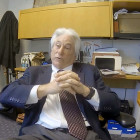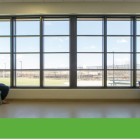
Telestory Unites New York Children — Briefly — with Incarcerated Parents
|
NEW YORK — As the lullaby started, a little boy named Sean listened intently. His mother watched him. She had written and prerecorded the song for him from Rikers Island.
Juvenile Justice Information Exchange (https://jjie.org/page/196/)

In late September, Torri was driving down the highway with her 11-year-old son Junior in the back seat when her phone started ringing.
It was the Hamilton County Sheriff’s deputy who worked at Junior’s middle school in Chattanooga, Tennessee. Deputy Arthur Richardson asked Torri where she was. She told him she was on the way to a family birthday dinner at LongHorn Steakhouse.
“He said, ‘Is Junior with you?’” Torri recalled.
Earlier that day, Junior had been accused by other students of making a threat against the school. When Torri had come to pick him up, she’d spoken with Richardson and with administrators, who’d told her he was allowed to return to class the next day. The principal had said she would carry out an investigation then. ProPublica and WPLN are using a nickname for Junior and not including Torri’s last name at the family’s request, to prevent him from being identifiable.
When Richardson called her in the car, Torri immediately felt uneasy. He didn’t say much before hanging up, and she thought about turning around to go home. But she kept driving. When they walked into the restaurant, Torri watched as Junior happily greeted his family.
Soon her phone rang again. It was the deputy. He said he was outside in the strip mall’s parking lot and needed to talk to Junior. Torri called Junior’s stepdad, Kevin Boyer, for extra support, putting him on speaker as she went outside to talk to Richardson. She left Junior with the family, wanting to protect her son for as long as she could ...

NEW YORK — As the lullaby started, a little boy named Sean listened intently. His mother watched him. She had written and prerecorded the song for him from Rikers Island.

Each year, thousands of children are subjected to solitary confinement in juvenile facilities and adult jails and prisons. Solitary confinement — also known as room confinement, seclusion, isolation or segregation — is the involuntary placement of a youth alone in a cell, room or other area for any reason.

When I became a judge, it didn’t take long to question why so many kids appeared in my court on minor school offenses. In 1995, the year before police were introduced to schools, there were only 50 referrals to the court. By 2004, it had increased to 1,200 referrals.

Michael Nash’s 30-year career as a jurist has mostly been focused on trying to make life better for Los Angeles County’s children. He is about to embark on a new challenge relating to LA’s foster kids: Early next year, he will become the first director of Los Angeles County’s new Office of Child Protection.

School officials treat rap music as a serious threat to the school environment. Fear and misunderstanding of, as well as bias against, this highly popular and lucrative musical art form negatively shape their perspectives on this vital aspect of youth culture.

WASHINGTON — Most states continue to house youth in adult prisons, putting them at risk for physical and sexual abuse, says a new report.
The false belief that I had was that I was protecting my block, making sure no outsiders messed with my friends and family. But in reality all we do is lie, cheat and steal from each other and in most cases kill one another.
States must begin piecing together a strategy to reduce recidivism and improve other outcomes for young adults using a few broad approaches, says a new report from the Justice Center at the Council of State Governments.